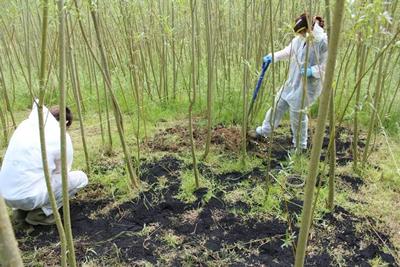Damaging effects of biochar on plant defence casts doubt on geoengineering claims

In the first study of its kind, research undertaken at the University of Southampton has cast significant doubt over the use of biochar to alleviate climate change.
Biochar is produced when wood is combusted at high temperatures to make bio-oil and has been proposed as a method of geoengineering. When buried in the soil, this carbon rich substance could potentially lock-up carbon and reduced greenhouse gas emissions. The global potential of biochar is considered to be large, with up to 12 per cent of emissions reduced by biochar soil application.
Many previous reports have shown that biochar can also stimulate crop growth and yield, providing a valuable co-benefit when the soil is treated with biochar, but the mechanism enabling this to happen is unknown.
Professor Gail Taylor, Director of Research at the University's Centre for Biological Sciences and research colleagues, in collaboration with National Research Council (CNR) scientists in Italy and The Hutton Institute in Scotland, have provided an explanation why biochar has this impact. They have published their findings in the journal Global Change Biology Bioenergy.

They found that when thale cress and lettuce plants were subjected to increasing amounts of biochar mixed with soil, using the equivalent of up to 50 tonnes ha-1 y-1, if applied in the field, plant growth was stimulated by over 100 per cent. For the first time, the response of more than 10,000 genes was followed simultaneously, which identified brassinosteroids and auxins and their signalling molecules as key to the growth stimulation observed in biochar. Brassinosteroids and auxins are two growth promoting plant hormones and the study goes further in showing that their signalling molecules were also stimulated by biochar application.
However, the positive impacts of biochar were coupled with negative findings for a suite of genes that are known to determine the ability of a plant to withstand attack from pests and pathogens. These defence genes were consistently reduced following biochar application to the soil, for example jasmonic and salcyclic acid and ethylene, suggesting that crops grown on biochar may be more susceptible to attack by pests and pathogens. This was a surprising finding and suggests that if reproduced in the field at larger scales, could have wide implications for the use of biochar on commercial crops.
Professor Taylor, who co-ordinated the research, says: "Our findings provide the very first insight into how biochar stimulates plant growth - we now know that cell expansion is stimulated in roots and leaves alike and this appears to be the consequence of a complex signalling network that is focussed around two plant growth hormones. However, the finding for plant defence genes was entirely unpredicted and could have serious consequences for the commercial development and deployment of biochar in future. Any risk to agriculture is likely to prevent wide scale use of biochar and we now need to see which pest and pathogens are sensitive to the gene expression changes."
Related Staff Member
Other University of Southampton sites
Links to external websites
The University cannot accept responsibility for external websites.
